Дискурсивные аспекты изучения эмоций и эмоциональная лингвоэкология. Рубрика в журнале - Вестник Волгоградского государственного университета. Серия 2: Языкознание
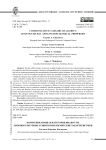
Communicative category of alterity: linguocultural and linguoecological properties
Статья научная
The aim of the article is to give an in-depth insight into alterity as a communication category in the cognitive and discursive aspects. Being an indispensable part of communication and cognition, the category has its own meaning presenting the communicative interaction within the frame “I - the Other”. The category of alterity has its own set of category properties, which are specified uniquely in different languages. Alterity as a linguistic category may express an outlook on the reality (similar, i.e. familiar, devoid of risk: other, different, vague, evidently evoking fear or curiosity). In the Russian language, it is linked to the emotional clusters of curiosity , fear , suspense , whereas in the English language it is associated with curiosity , admiration , surprise and novice . Alterity is characterized similarly in English and Russian through maintaining such features as dissimilarity , variety , multifariousness , belonging to different classes / groups , distinct opposition . As well as common features, alterity manifests culturally specific meanings in English ( being eccentric , revolutionary , new , fresh ) and Russian ( being funny and incongruous ). The article includes a description of the linguistic means and communicative strategies and tactics, with the help of which the category of alterity is realized in fiction. The category content is variable in the discourse and it serves ground for the ecological and non-ecological mode of communication.
Бесплатно
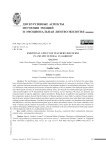
Emotional effect of teachers’ discourse in a multicultural classroom
Статья научная
The manifestation, meaning, categorization of emotions, as well as the factors that cause them, have cultural characteristics. To build successful intercultural interaction it is necessary to be aware of them. This study explores classroom discourse and emotions of international students in a multicultural classroom. Our goal is to determine what emotions the discourse of Russian teachers evokes in students from different lingua-cultures and which speech acts have an emotional perlocutionary effect. The material was obtained through a questionnaire with the participation of 70 international students (45 Chinese and 25 Algerian). We focus on emotions and emotional states of surprise, happiness, sadness and offense. Being drawn on qualitative and quantitative methods the comparative analysis showed that the behavior of Russian teachers is more likely to surprise Chinese students than Arab ones, besides Chinese students experience negative emotions and states more often than Arabs which may indicate a greater cultural distance. In relation to speech acts that evoke the emotions, we identified some similarities and differences, which are discussed through the type of culture and cultural values. The results contribute to the study of culture specific features of emotions in communication. They specify the factors that evoke emotions in students belonging to different lingua-cultures, and can contribute to the successful interaction of Russian teachers with international students in a multicultural classroom.
Бесплатно
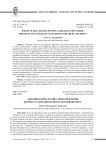
Emotive pragmatics of popularisation discourse: the impact of contextualisation on reader's interest
Статья научная
The paper adheres to the pragmatic approach to emotion processes and focuses on emotion- evocative communication. Its goal is to investigate the impact of contextualisation techniques, which employed by popularisation discourse to induce readers’ interest. The research is carried out in two ways, discourse-pragmatic and experimental. First, by adopting the sociopragmatic view of emotions and using methods of discourse analysis, the paper fleshes out a model of emotion-evocative communication, outlines contextualisation techniques, and introduces text materials. Second, by representing the experimental study, the paper assesses the interest-evoking effect of contextualisation. The experimental study involved 400 undergraduate students. We employed the scaling method (7-point bipolar scales) to measure participants’ attitude to generalised and contextualised text passages. The data analysis applied the Wilcoxon test, the Kolmogorov - Smirnov test, Spearman’s correlation coefficient, the linear regression, and the explanatory factor analysis. The comparing tests reveal that contextualisation promotes reader’s interest in the popularisation text. The findings suggest that contextualisation techniques make the text content more relevant to the reader. Personal relevance - as a kind of mediator - causes interest responses . Beyond that, it was found that that reader’s expectations about text strategies to presents knowledge construct interest- evocative communication. The findings demonstrate how communicative variables combine into the model of emotion-evocative communication.
Бесплатно
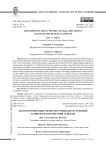
Дискоммуникация: межкультурный, дискурсивный и лингвоэкологический аспекты
Статья научная
В статье уточняется понятие дискоммуникации, определяется его место в ряду смежных понятий: коммуникативной неудачи и коммуникативного конфликта, предлагаются пути исследования дискоммуникации на дискурсивном уровне. В рамках концепции эмотивной экологичности коммуникации, разработанной В.И. Шаховским, предложена новая трактовка дискоммуникации как зонтичного термина, объединяющего разнообразные варианты неэффективного общения в результате неосуществления или неполного осуществления коммуникативного намерения и недостижения поставленных целей или их рассогласования. В межкультурном и интракультурном общении итоговая неэффективность и нерезультативность взаимодействия коммуникантов обусловлена рядом причин как лингвистического, так и экстралингвистического характера, среди которых нарушение этических норм и лингвоэкологичности общения; несоблюдение правил аргументации; применение манипулятивных стратегий и др. Неосуществление замысла адресанта иллюстрируется контекстами из русскоязычного судебного дискурса, демонстрирующими нарушения в целеполагании, несоблюдение правил аргументации (нарушение границ тезиса, обращение к некорректной аргументации и т. п.), неудачную вербализацию замысла. Расширение списка дискурсов для анализа дискоммуникации позволит в будущем выявить специфику ее реализации в различных речевых жанрах и типах общения, установить причины ее возникновения и создать рекомендации по ее преодолению. Я.А. Волковой и Н.Н. Панченко проанализированы существующие в научных парадигмах подходы к определению понятия дискоммуникации, дано рабочее определение, предлагаемое к использованию на дискурсивном уровне. Обоснован выбор судебного дискурса в качестве материала исследования институциональной специфики дискоммуникации. Н.К. Пригариной выделены основные причины возникновения дискоммуникации в судебном дискурсе, проведен анализ примеров дискоммуникации в судебном дискурсе.
Бесплатно
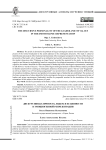
Дискурсивная личность лидера и ее ценности в эмоциогенной репрезентации
Статья научная
Статья посвящена проблеме лингвоаксиологического изучения элементов ценностной картины мира современных лидеров, транслируемых молодежной аудитории в эмоциогенном дискурсе. Цель работы заключается в выявлении и описании фактов эмоциональной репрезентации аксиологической составляющей в текстах дискурсивной личности лидера, под которым понимается влиятельная и признанная в социуме персона. Материалом для исследования послужили видеозаписи заседаний дискуссионного студенческого клуба «Диалог на Равных». В русле когнитивно-дискурсивной методологии, опирающейся на признание аксиологических параметров дискурса детерминирующими когницию, авторами представлены ценностные компоненты лидерства в их эмоциогенной репрезентации, вербализуемые как «секреты успеха». Установлены речевые инструменты создания эмоциогенного высказывания: дискурсивные жанры «совет» и «предложение», а также косвенный способ «наставления молодежи» в нарративной форме с адгерентной эмотивностью. С помощью моделирования аксиосферы установлены ядерные (доминирующие) и периферийные концептуальные признаки лидерства. Результаты анализа фреймового состава объективированных в эмоциогенном дискурсе ценностей как компонентов личностной системы лидеров и группового сознания (лидерства) свидетельствуют о целенаправленной деятельности субъекта дискурса по созданию позитивного эмоционального поля при трансляции ценностных ориентиров.
Бесплатно

